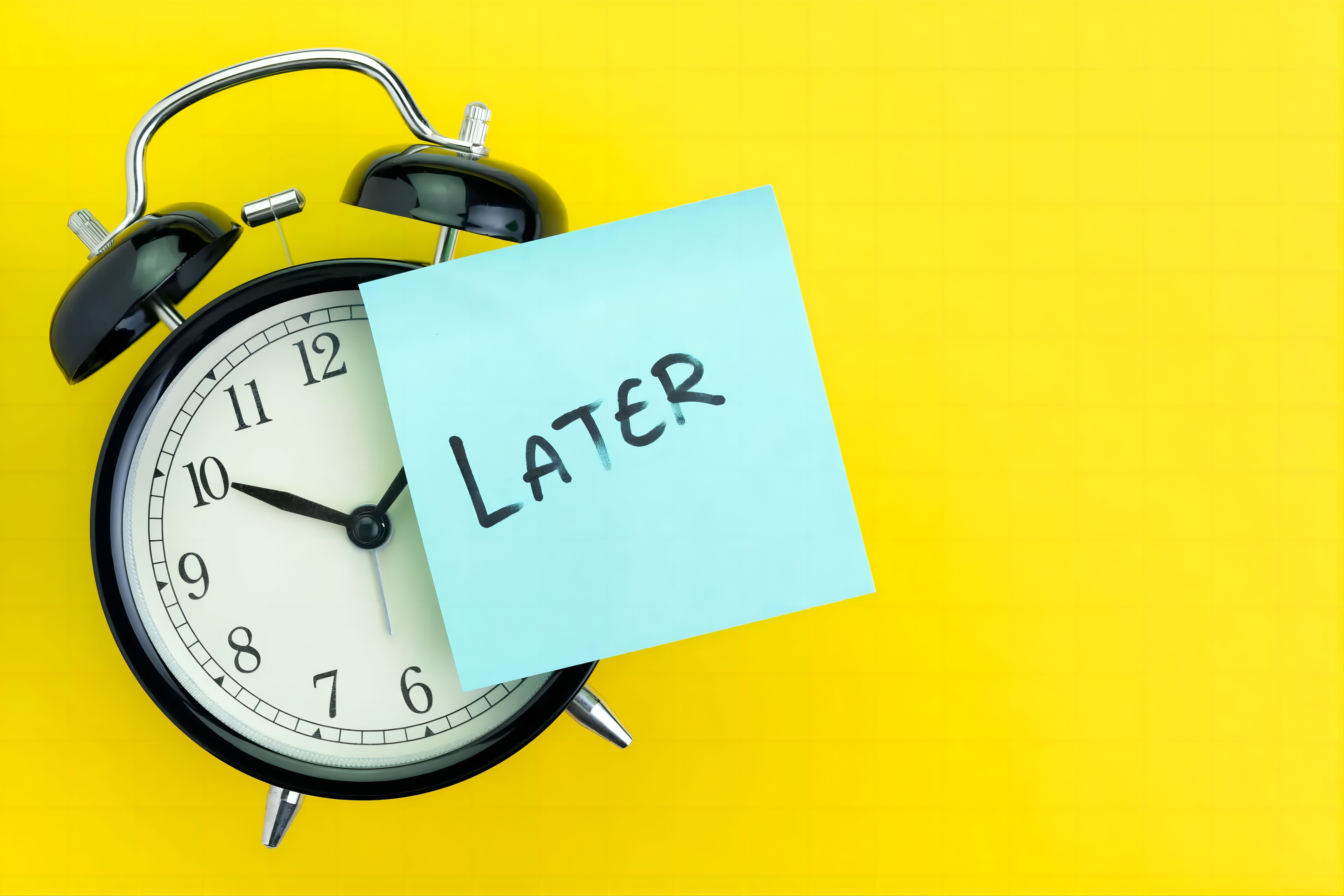If you’ve ever pushed off an important task because you were alphabetizing your home organizer, you know it’s unfair to describe yourself as lazy.
After all, arranging them in alphabetical order requires concentration and effort, and you might even make a point of wiping each bottle clean before putting it back. You’re not hanging out with friends, you’re cleaning – your parents will be proud! It’s not laziness or poor time management. This is procrastination.
If “Procrastination” Has Nothing to Do With Laziness, What Does It Have to Do With It?
Etymologically, “procrastinate” comes from the Latin verb procrastinare – to put off until tomorrow. But it’s not just voluntary procrastination. Procrastination also comes from the ancient Greek word akrasia, which means to do something against one’s judgment.
“It’s a form of self-harm,” says Dr. Pierce Steele, a professor of motivational psychology at the University of Calgary.
This self-awareness is a key reason why procrastination makes us feel so bad. When we procrastinate, we not only realize that we are avoiding relevant tasks, but we also realize that doing so is probably a bad idea. Yet, we did it anyway.
Dr Fuschia Sirois, professor of psychology at the University of Sheffield, said: “That’s why we say procrastination is inherently irrational. There’s no point in doing it when you know it will have negative consequences.”
“People get stuck in this irrational cycle of chronic procrastination because they can’t manage the negative emotions surrounding the task,” she adds.
So, do we procrastinate because we’re in a bad mood? In short: yes.
Procrastination is not a unique character flaw or a mysterious curse on your ability to manage time, but rather a way of coping with the challenging emotions and negative emotions caused by certain tasks—boredom, anxiety, insecurity, Frustration, resentment, self-doubt, and more.
“Procrastination is an emotion regulation problem, not a time management problem,” said Dr. Tim Pychyl, a professor of psychology at Carleton University in Ottawa and a member of a procrastination research team.
In a 2013 study, Dr. Pychyl and Dr. Sirois found that procrastination can be understood as “a priority for short-term emotional repair… rather than the long-term pursuit of desired actions.” Simply put, procrastination is focusing more on the immediate task of dealing with negative emotions rather than getting on with the task.
The particular nature of our disgust depends on the specific task or situation. It might be due to some inherent unpleasantness of the task itself—having to clean a dirty bathroom or putting together a long, boring spreadsheet for your boss. But it can also stem from deeper feelings related to the task, such as self-doubt, low self-esteem, anxiety, or insecurity. Staring at a blank document, you might be thinking, I’m not smart enough to write this. Writing is so hard. What if I don’t do well?
All of which makes us think that it’s a good idea to put the documents aside and clean out the drawer.
But, of course, this only exacerbates our negative associations with the task, and whenever we return to the task, those feelings are still there, along with increased stress and anxiety, feelings of low self-esteem, and self-blame.
In fact, there’s an entire body of research devoted to the ruminative, self-blaming thoughts many of us tend to have after procrastinating, called “procrastination cognitions.” Dr. Sirois says our thoughts about procrastination often exacerbate our pain and stress, leading to further procrastination.
But the moment of relief we feel when we procrastinate is actually the root of this vicious cycle. “Procrastinating a task feels relaxing in the moment—you’re being rewarded for procrastinating,” says Dr. Sirois. We know from basic behaviorism that when we are rewarded for something, we tend to do it again. This is precisely why procrastination is often not a one-time behavior but a cycle, one that can easily become a chronic habit.
Over time, chronic procrastination not only reduces productivity, but also has significantly damaging effects on our physical and mental health, including chronic stress, general psychological distress and low life satisfaction, symptoms of depression and anxiety, and poor health Behavior, chronic illness, and even hypertension and cardiovascular disease.
Do We Procrastinate to Feel Better?
If it seems ironic that we procrastinate to avoid negative emotions but end up feeling worse, that’s because it’s true. Once again we have evolution to thank.
Procrastination is a perfect example of “present bias,” our innate tendency to prioritize short-term needs over long-term needs.
“We’re really not designing with the future in mind because we need to focus on feeding ourselves in the here and now,” said psychologist Hal Hershfield, Ph.D., a marketing professor at the UCLA Anderson School of Management.
Dr. Hershfield’s research shows that, at a neurological level, we think of our “future selves” more as strangers than as part of ourselves. When we procrastinate, part of our brain actually thinks that the task we’re putting off—and the negativity that comes with it—is someone else’s problem.
Worse, we are even less able to make thoughtful, future-oriented decisions when under pressure. When faced with a task that makes us feel anxious or insecure, the amygdala—the “threat detector” part of the brain—perceives the task as a real threat, in this case to our self-esteem Or a threat to happiness. Even if we intellectually recognize that procrastinating on a task will cause us more stress in the future, our brains are still more focused on eliminating the threat in the present. Researchers call this “amygdala hijacking.”
Unfortunately, telling ourselves to stop procrastinating doesn’t do much good. Despite the popularity of “productivity tips,” focusing on how to get more done doesn’t address the root causes of procrastination.
So What Is the Root Cause of Our Procrastination?
We must realize that procrastination is about emotion, not efficiency. The solution doesn’t require downloading a time management app or learning new self-control strategies. It’s about managing our emotions in a new way.
“Our brains are always looking for relative rewards. If we have a habit of procrastinating, but we also Without finding a better reward, our brain repeats it over and over again until we give it something better to do.”
When it comes to procrastination, we must find better rewards than avoidance—ones that alleviate the challenge of the moment without causing harm to our future selves. The difficult thing about breaking a procrastination addiction, Dr. Brewer says, is that countless potential alternative behaviors are still forms of procrastination. This is why solutions must be internal and cannot depend on anything but ourselves.
One way to do this is to forgive yourself when you procrastinate. In a 2010 study, researchers found that students who were able to forgive themselves for procrastinating while studying for a first test procrastinated less when studying for the next test. They concluded that self-forgiveness improves learning by allowing “individuals to move beyond their maladaptive behavior and focus on the upcoming exam without being burdened by past behavior.”
Another strategy is the related practice of self-compassion, which is treating ourselves with kindness and understanding when faced with our mistakes and failures. In a 2012 study, Dr. Sirois examined the relationship between stress, self-compassion, and procrastination. He found that people who procrastinate tend to be more stressed and have lower levels of self-compassion, suggesting that self-compassion can “buffer negative reactions to self-related events.”
Some research shows that self-compassion helps with motivation and personal growth. Not only does it reduce psychological distress (which we now know is a major culprit in procrastination), but it also actively stimulates motivation, enhances feelings of self-worth, and fosters positive emotions such as optimism, wisdom, curiosity, and personal initiative. Best of all, self-compassion doesn’t require anything external—just approaching your challenges with greater acceptance and kindness rather than rumination and regret.
This may be easier said than done but try to reframe the task by thinking about the positive aspects of it. Maybe you remind yourself that you’ve done something similar before with good results, or you think about the beneficial consequences of completing a task. What do your bosses or partners say when you show your work to them? How do you feel about yourself?


